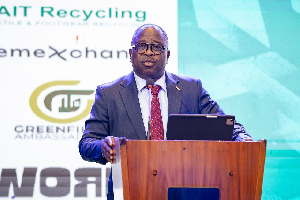Ghana is taking steps to shift from a linear economic model to a regenerative, resource-efficient circular economy, according to the Minister of State for Climate Change and Sustainability, Seidu Issifu.
Speaking at a recent summit in Accra, he highlighted a comprehensive national strategy for the circular transition, emphasising innovation, youth leadership, and partnerships as key pillars.
“Ghana is charting a clear course to transition from a linear economic model, where products are produced, used, and discarded, to a circular economy that is regenerative, resource-efficient, and inclusive.
“This transition is central to our climate strategy, poverty reduction, and green industrialisation ambitions. It aligns closely with our Nationally Determined Contributions, the Sustainable Development Goals, and importantly, the manifesto priorities of the National Democratic Congress, which place strong emphasis on recycling, environmental protection, sustainable infrastructure, and circular value chains, including their development,” he remarked.
Seidu Issifu further outlined the government’s targeted efforts in three major sectors: textiles, plastics, and electronic and construction waste.
“We are supporting circular fashion initiatives that scale reuse, repair, and resale models. We are also working in partnership with Landfill to Landmark to develop comprehensive policy regulations on Extended Producer Responsibility (EPR). These regulations will shift responsibility upstream,” he added.
He also called on investors, civil society, and other key stakeholders to help create a sustainable and inclusive circular future.
“Together, we can turn Ghana’s waste into wealth, our environmental challenges into climate-smart solutions, and our youth into champions of regeneration. Let’s build this future boldly, collaboratively, and inclusively,” he concluded.
JKB/MA
Watch as thieves raid popular Bibiani chop bar, steal meat, eggs and utensils in bold midnight heist



